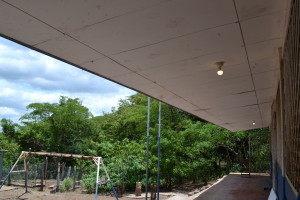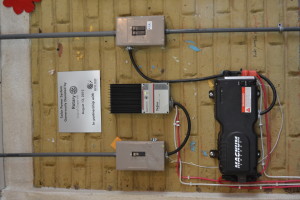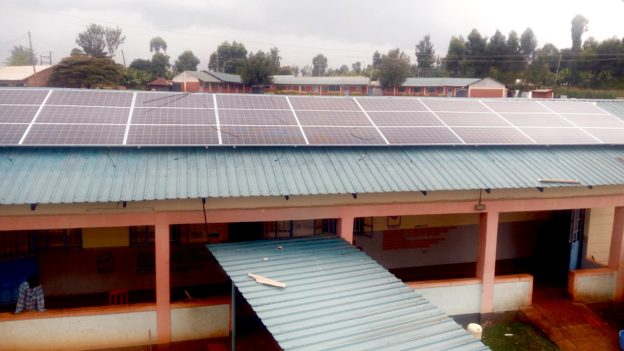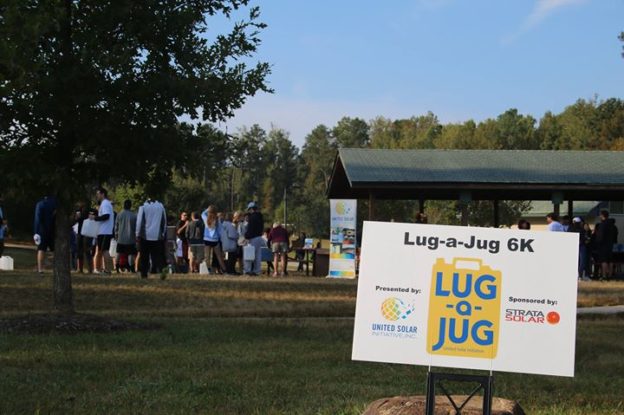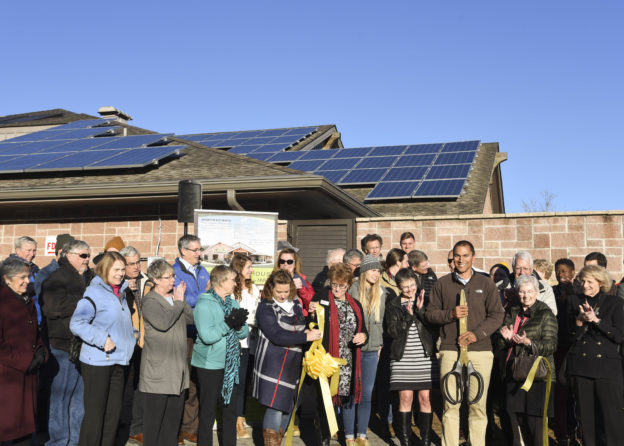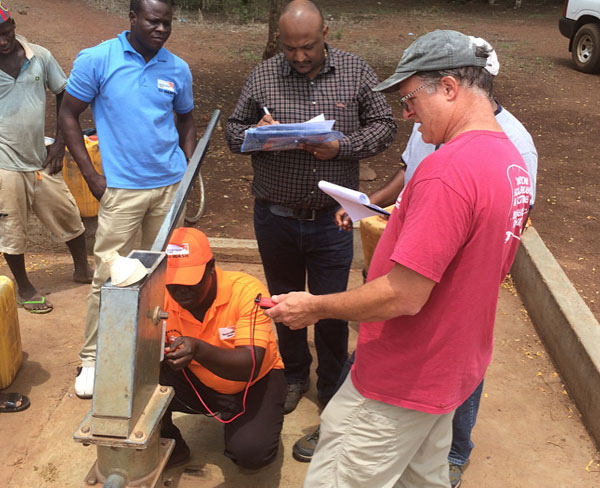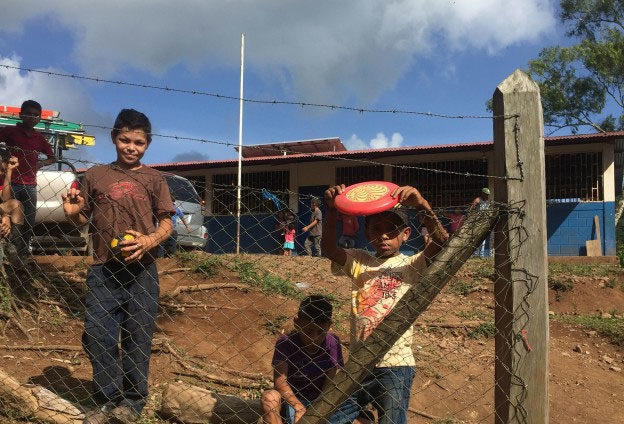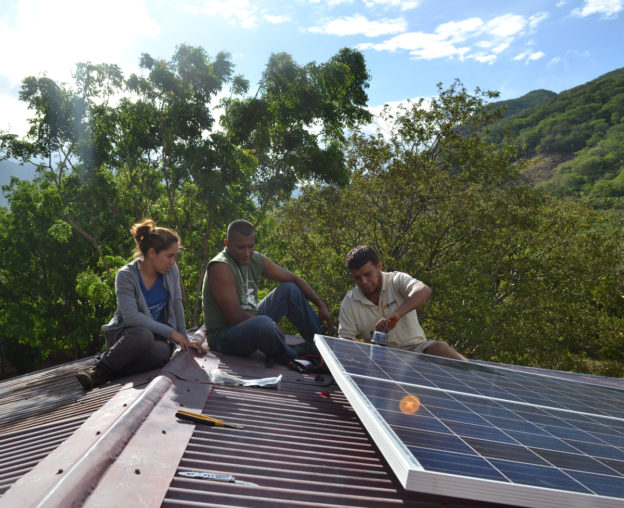In 2020, United Solar Initiative, a global energy access nonprofit project developer, designed and built an 8.7kW solar + storage microgrid in Kenya at a women’s hospital with the support of healthcare NGO funding partner Curamericas Global, microgrid technology provider Schneider Electric, and Kenyan solar installer PowerPoint Systems.
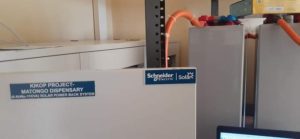
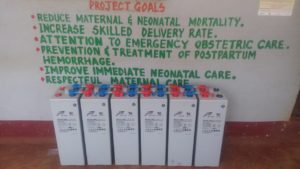
This system provides backup power to critical loads at the birthing center which incurs weekly power outages. The project development was completed remotely during the global pandemic and constructed by the local install team as soon as essential operations were allowed to commence per local Kenyan safety mandates. Since going online in August of 2020, the facility has saved money each month in their energy costs from the utility which allow more hospital supplies to be purchased. Most importantly though, the facility has seen a drastic increase in the number of births that the doctors at the Matongo Clinic are now supporting. Previously, 1 in 3 women gave birth in her home in less sanitary conditions rather than risk being turned away because of a power outage.
As result of Curamerica Global’s engagement in the community and a United Solar Initiative’s investment in the onsite renewable energy at the facility, mothers now have a location they can count on with access to clean and reliable electricity. Today, 95% of deliveries take place at the health facility with a skilled birth attendant.
In 2018, United Solar installed a solar system at Hope House, which provides temporary shelter to foreign refugees acclimating to a new home and culture. The system lowers the cost of operating the shelter.
On October 15th, 2016 USI hosted its first annual Lug-a-Jug fundraising event in Chapel Hill. The event boasted a great turnout for the inaugural event, raising over $5,000 to help USI bring solar-powered water pumps to villages in Africa and provide educational trainings for the upkeep and maintenance of those systems.
The event was designed to help raise awareness of the long walk many Africans must make every day in order to get water. USI’s founder, Steven Thomsen says “I wanted to help people connect with what life is like for people that don’t have access to clean water.” Thanks again to everyone who helped make this event a success.
United Solar Initiative hosted its 2nd Annual Lug-a-Jug Walk on September 30, 2017 to raise funds for our work with World Vision in Sub-Saharan Africa. We are proud to continue this three-year partnership.
On average, women and children in Sub-Saharan Africa have to walk 6K each day just to get clean water. The Lug-a-Jug 6K Walk attempts to simulate what this population has to do each day. Participants carried an empty jug for the first half of the race, filled it up at a natural water source, and lugged the jug back for the second half.
Clean water is not universal. Almost 700 million people do not have access to clean water. World Vision supports 2,000 water pumps throughout Africa, South America, and East Asia providing clean water to a new person every 30 seconds. These water pumps are typically run by an unreliable grid system, diesel fuel or hand cranks. Our solar technicians, Ed Witkin and Jon Ruth visited Kenya, Mali, Zambia, and Ghana to train World Vision Staff to install solar panels to power the pumps.
Better access to clean water positively affects communities in many ways. If women and children spend less time getting water, they’ll have more time to get an education, empower themselves and have a healthier lifestyle. Our work towards alleviating water poverty with solar solutions is a smart way to increase water supply resiliency and accessibility.
United Solar Initiative hosted its 2nd Annual Lug-a-Jug Walk on September 30, 2017 to raise funds for our work with World Vision in Sub-Saharan Africa. We are proud to continue this three-year partnership.
On average, women and children in Sub-Saharan Africa have to walk 6K each day just to get clean water. The Lug-a-Jug 6K Walk attempts to simulate what this population has to do each day. Participants carried an empty jug for the first half of the race, filled it up at a natural water source, and lugged the jug back for the second half.
Clean water is not universal. Almost 700 million people do not have access to clean water. World Vision supports 2,000 water pumps throughout Africa, South America, and East Asia providing clean water to a new person every 30 seconds. These water pumps are typically run by an unreliable grid system, diesel fuel or hand cranks. Our solar technicians, Ed Witkin and Jon Ruth visited Kenya, Mali, Zambia, and Ghana to train World Vision Staff to install solar panels to power the pumps.
Better access to clean water positively affects communities in many ways. If women and children spend less time getting water, they’ll have more time to get an education, empower themselves and have a healthier lifestyle. Our work towards alleviating water poverty with solar solutions is a smart way to increase water supply resiliency and accessibility.
United Solar Initiative is excited to partner with Habitat for Humanity of Chatham County. Habitat for Humanity is an international non-profit organization that offers safe and affordable shelter for families in need. USI has donated panels and labor to install solar PV systems on new construction homes in the Chatham County area to reduce energy bills for homeowners.
The mission of Hospitality House is to rebuild lives and strengthen community by providing a safe, nurturing, healthy environment in which individuals and families experiencing homelessness and poverty-related crises are equipped to become self-sufficient and productive. United Solar Initiative is proud to partner with this organization to help them move towards becoming more sustainable.
In early November, United Solar Initiative provided the 54 panels to the Hospitality House of Boone, North Carolina. The 13kW system was installed with the help of SunVolt Electric and Renewable Energy. Considering that this was our first install of this size, and the first of its kind in the United States, it is impressive that the project was successfully completed. The Hospitality House was great to work with and was very supportive throughout the entire process.
The system is a buy-all sell-all system where they will still be purchasing all of their energy from their local utility company, Blue Ridge Energy. The Hospitality House will be exporting the energy produced to the utility for a credit, which will offset the energy bill each month. The system should pay for itself in four to six years. Going solar is a symbol of the organization’s commitment to the environment.
United Solar Initiative has been working to facilitate solar energy solutions to address energy and water poverty in underdeveloped communities around the world. One of our partners in this effort is World Vision who has been promoting efficient and sustainable options for water supply systems and has introduced the use of solar powered systems.
USI was asked by World Vision to organize international training sessions to build the capacity of their WASH (Water Sanitation and Hygiene) staff. The first training took place in Tamale, Ghana in June of 2016. Further trainings were conducted in Namanga, Kenya and in Choma, Zambi in February of 2017.
The trainings led by Ed Witkin and Jay Peltz, both USI members, were designed to equip the WASH staff in the basic understanding of the Design, Installation and Troubleshooting of Solar Powered Water Supply Systems. Each session brought together 20-25 participants from several World Vision (WV) National Offices, and the trainings consisted of both classroom time and field visits to existing solar water pumping sites.
We discovered that there were common design and installation issues with many of the solar water pumping systems we visited. Some of these issues include a lack of system monitoring, improper sizing of the solar array, pump, water pipes, etc. This provided a great teaching opportunity, and our hope is that future systems will work more efficiently and reliably.
United Solar Initiative looks forward to continuing to provide training to World Vision staff in the years to come.
In June 2016, USI, along with Appropriate Technology students from Appalachian State University, installed a solar PV array in the Santa Ana community. This is the first alternating current (AC) system installed, with hopes that as the Nicaraguan government expands the reach of the grid infrastructure in coming years, this community will eventually be able to connect and disconnect as needed.
Alongside the supervision and guidance of a local solar installation company, Appalachian State students participated in the wiring and commissioning of the solar array to power LED lighting for night classes and cloudy school days, and a radio/CD player to be used for school lessons and community social gatherings.
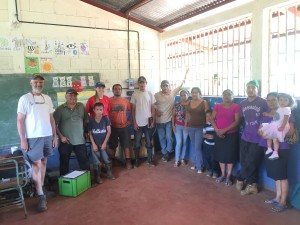
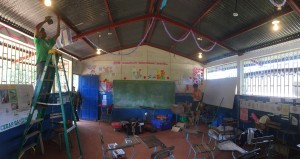
The community of Colocondo is centered around a dirt courtyard surrounded by small homes, a community store, and the school house. A short distance away the Colocondo River winds through the mountains before crashing down Colodondo Falls in Tisey Estanzuela Natural Reserve. The community has a partnership with SONATI, a nonprofit ecotourism organization which brings tourists to a community to see the natural beauty and in return the community pledges to conserve and protect that natural beauty. As part of this partnership, SONATI also works to improve the community in other ways, bringing in educational materials, course ideas and educating the adults on numerous public health initiatives. As part of this desire to improve the community, SONATI partnered with USI to bring electricity to a classroom which previously used kerosene lights to light their classrooms when necessary.
The classroom at Colocondo now has a 500-watt solar array which lights their classroom inside and out and allows for phone charging, TV and video equipment, a CD player, and a computer to use for classes. This represents a huge step for Colocondo and progress towards what large parts of the rest of the world take for granted. The impact this system will have on this community was seen in the faces of the kids who, off from school while the construction was going on, still stayed glued to the school house, watching through the open air windows as the wires were strung through the ceiling and lights were installed from the rafters.
We are very happy to say that Colocondo now has a sustainable source of energy to use for the education of their community and to power their phones and connect them to the world beyond.
